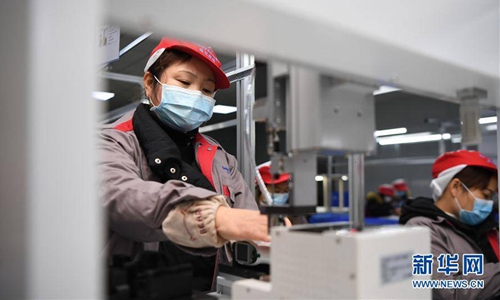HOME >> SOURCE
Companies in central China province switch production to support epidemic prevention
Source:Xinhua Published: 2020/3/16 13:40:05

People work at a factory of a toy-making company in Xiangtan, central China's Hunan Province, March 6, 2020. Since the outbreak of the COVID-19, the toymaker in Hunan Province has changed its factory over to production of infrared thermometer to aid the fight against the novel coronavirus. (Xinhua/Xue Yuge)
Suspending the production of mini plastic toys authorized by Disney, Hu Zhihui, a 42-year-old worker, assembled the spring button and put it into the shell of an infrared thermometer.
She has mastered the workflow just a few days after taking up her post.
The factory Hu works at belongs to Hunan Sunny & Sandy Toy Manufacturing Co., Ltd., which has switched its 38 out of 40 sets of equipment for producing mini plastic toys into the production of infrared thermometer, a necessary product of epidemic prevention.
"Each link of the production has a detailed instruction chart, which is not difficult for us to operate," Hu said, adding that she was a newly recruited employee after the company switched its production, and there were more than 100 new workers at the plant of the company like her.
Located in the city of Xiangtan, central China's Hunan province, Sunny & Sandy Toy Manufacturer Co., Ltd. is an enterprise that produces food-grade plastic toys. The company, which has a wide range of cooperation partners such as Disney, Ferrero, Mars and other international brands, displays its products based on well-known cartoons and movies in the plant.
"We still have two sets of equipment operating for the toy production to complete the order for this year's European Cup in time," said Yang Jie, chairman of the company.
Since the outbreak of the epidemic, Yang has been concerned about the supply of epidemic prevention and control materials such as masks and infrared thermometers. Considering that the raw materials for the company's toy products are the same as those for the thermometer shells, he decided to use the existing production capacity to switch to manufacture infrared thermometers.
On Feb. 10 when the company resumed operation after the prolonged Spring Festival holiday due to the outbreak of the coronavirus, Yang contacted the local authorities to consult about the switch of production. With the assistance of the government, the company urgently got the medical device production license and submitted the samples for inspection soon.
"We have raw materials, mold equipment and patented technology," Yang said. Although it took some time to adjust the mold equipment, the company produced the first batch of samples in four days, he said. "We can produce all plastic accessories except electronic components and infrared sensors."
After 10 days of repeated testing and training of workers, on Feb. 24, the first batch of thermometers was officially put into production, and the daily output of the company has been increasing day by day. As of March 10, the daily output could reach 2,000.
"Now, customers from Japan, the Republic of Korea, Europe and the United States are consulting about the purchase. After increasing production, we will sell overseas under the condition of meeting the demand of the domestic market," Yang said. The company is also stepping up the processing of the US Food and Drug Administration (FDA) and CE certifications of the EU required for exports.
Same as the toymaker, Xiayu Industry and Trade Co. Ltd., also takes advantage of its existing capacity to produce epidemic prevention supplies.
"As we used to mainly produce raincoats, the current equipment and production line can be quickly converted to produce protective suits," said sources with the company.
The company held a meeting on Feb. 11, informed the nearby employees to return to work, cooperated with other medical supplies companies and started to prepare for the production license of medical devices. A day later, production was launched.
Through one day's trial, Xiayu produced 120 pieces of non-sterile protective suits. The factory director and the production supervisor later held a meeting to discuss the running process so as to further improve the production efficiency and product quality.
"To make more protective clothing means we can contribute more to the battle against the epidemic," said Tan Xueming, general manager of the company. Tan said the company's daily output of protective clothing can reach 600 pieces at present.
While taking measures to prevent the virus from spreading among employees, the company will also increase the number of employees to strive to produce 1,000 pieces each day, according to Tan.
Posted in: COMPANIES